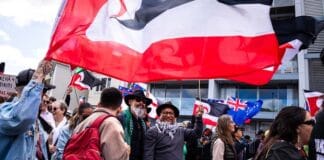History’s Children: History wars in the classroom
By Anna Clark
UNSW Press, $29.95
High school students are mostly bored with Australian history.
That’s the sad conclusion reached by Anna Clark after interviewing 182 students, 43 teachers and 20 education department officials Australia-wide for her new book History’s children.
Clark’s book is an indictment of John Howard and his decade-long attack on historians and teachers; and of Labor premiers like Bob Carr who have demanded that students learn the “glorious” history of Australian democracy.
Some students were alert to the way they were being manipulated. “Robert”, a Year 12 student from Perth, summed it up: “I get the feeling that all through high school there’s this massive push to be a patriot and to be involved and to understand about Australia. But I think it’s one of the most boring countries in the world, and I’d rather learn about America or China”.
These attitudes did not reflect an indifference to history; students were enthusiastic about studying events like wars and revolutions in other countries. But they also wanted history to explain how the world had developed to become what it is.
Such an approach was the last thing Howard and the Labor governments wanted.
The result could be seen in attitudes to Indigenous history. It bored students to death-it was shallow and repeated similar material year after year.
But there was also resentment at the way Indigenous history was taught as a story of white crimes: “They don’t like being made to feel guilty for something that they didn’t have any control over.” Some students even explicitly supported Howard’s refusal to apologise over the Stolen Generations.
But Clark also found considerable sympathy with Aboriginal people, and a belief that learning Indigenous history was important. Yet she offers no way to explain this.
The only honest explanation is that the dispossession of Aboriginal people was not a product of the actions of “white” society as a whole, but of its rulers. It was not ordinary Australians who dispossessed Aboriginal people, but the pastoralists, police, military and public service chiefs. Ordinary Australians did not steal Aboriginal kids, nor grab Aboriginal land for mining, nor kill Aboriginal people in custody.
Some ordinary Australians have done terrible things, but they did so in the context of expansionary, settler capitalism.
Such a view of dispossession is counterposed to the idea of a common Australian national story-an idea at the heart of government approaches to teaching history.
Clark shows that students enjoyed history when given the chance to discuss and debate it, but points out that the teaching of Indigenous history has been drained of all controversy, except for subjects in Year 12.
The one Australian history topic that engaged students everywhere was the ANZAC story. Here, students found the drama and the heroism missing elsewhere in the syllabus.
Yet she also noted that students were open to critical discussion about the First World War.
But material on the experience of people on the other side or the repeated banning of left wing political parties at home would also undermine conservative myths about Australian democracy.
Anna Clark’s interviews are invaluable, but her analysis is one-dimensional. She sees better coordination of the curriculum, to eliminate boring repetition, as a major solution.
She dismisses any idea that the problem is political because Bob Carr and John Howard, who supposedly represent left and right, both support the same approach.
Her book is entirely removed from any wider context of people’s feelings about politics or society.
In the universities, there has been a massive decline in student interest in studying Australian politics, while enrolments in international relations have exploded-paralleling school student preference for global histories.
Underlying both is a desire for change, but a sense that change is impossible in Australia.
And this is connected to a belief-assiduously promoted by Howard and the conservatives-that nothing much happened in Australian history, that this society is the product of timeless, European values of hard work, entrepreneurship and parliamentary democracy.
The result is that students refuse to be indoctrinated, but in the absence of any alternative, simply switch off. But when students do see an alternative, they can switch back on. That is another lesson of the Vietnam era.
Phil Griffiths





